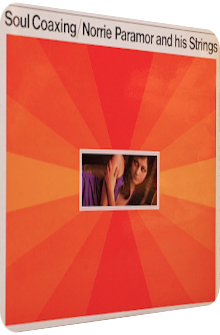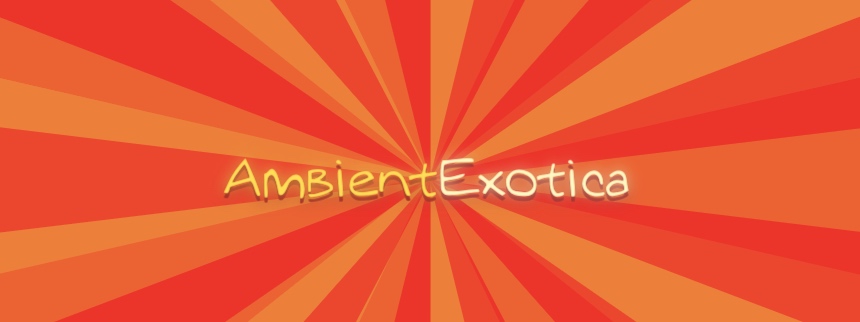
Norrie Paramor
Soul Coaxing
1968
Sometimes it happens that the front artwork and back sleeve of a record are not compatible with each other for a variety of reasons. In case of Soul Coaxing by British orchestra leader and composer Norrie Paramor (1914–1979), released on the Studio 2 Stereo label in 1968 and not to be mixed up with Decca’s Phase 2 Stereo branding of its recording technique, the reason has a name: Tim Rice. The poor author is seriously trying to weave a yarn around this album with Norrie Paramor’s name in the center. Standing for quality and superb music, the music on Soul Coaxing is brought up by a lover who explains to his lady what a top man Paramor is and what the album stands for. In short: spare me! We all know where this is going, and the two or three romantic tendrils that meander like ophidian reptiles through the table of contents are proof to the point that these two people are about to… fraternize, I suppose?
Anyway, back to the music, as Soul Coaxing offers 12 compositions of the uplifting and hammock-friendly kinds, most of them sporting a special instrument that carries the arrangement. Naturally, Exotica fans are used to alienating, widely exciting instruments. Soul Coaxing does not feature them, but it is nice to find a steel guitar, xylophone or harpsichord embroidered in the string-focused soundscapes. Why the album is a good one after all but eventually non-essential will be carved out in the following paragraphs.
The title track is but one curious choice amid the universe of Norrie Paramor, amd these choices seem to increase as the orchestra leader approaches the 70’s. Soul Coaxing is originally written by Michel Polnareff and is presented here in 6/8 time, comprising of helical harps amid auroral strings and rhythm pianos. You have heard it all before, and if it weren’t for the timpani that errupt like thunder, the saccharified technicolor meadow would not even comprise one single cloudlet. Harold Adamson’s and Jimmy McHugh polyvalent A Lovely Way To Spend An Evening then is the expected ballad, catering to the Space-Age string aficionados via mauve-tinted violin washes and besotted flutes. Some tone sequences evoke cinematic exoticism à la sunset-colored bays. A good enough capsule of the lovestoned kind to be considered in an equally themed playlist.
While Francis Lai’s greatest hit A Man And A Woman sees its world-famous melody played by an accordions that’s agglutinated to a trumpet and is further chequered by coruscating harps and high-rise vibes, Al Hoffman’s, Charles E. King’s and Dick Manning’s Hapa Haole gold standard Hawaiian Wedding Song sees Paramor venture into the isles of golden dreams. The steel guitar is situated in the limelight, although the stereo-panning effect that is attached to this stringed instrument is a tad questionable and gimmicky nowadays. However, the soothing ukulele rhythm and drowsy glockenspiel blotches amplify the hammock-friendly aura, as do the laid-back strings that whirl in the background. In Maurice Jarre’s and Paul Francis Webster’s Somewhere My Love (aka Laura’s Theme) the strings become overexposed again, floating around pointillistic flutes, acoustic guitar undercurrents and bouzouki chintziness par excellence before Sam Coslow’s A Little White Gardenia is a great ballad that is surprisingly minimal. A flute, cautious harps and an electric piano is all there is over large parts of the tune.
Maurice Jarre’s Lawrence Theme kicks off side B and celebrates one of the greatest movie themes of all time, and Paramor knows how to make the arrangement sound eclectic: sun-dappled acoustic guitars, saffron bongos and piercing strings evoke a desert caravan with an Exotica attitude as displayed by the contrapuntal jungle xylophone whose wooden clicks serve as the (unintended?) comic relief. Cole Porter’s adjacent Love For Sale then boosts the beautiful euphony of the strings as Paramor makes this a warped Space-Age artifact complete with insouciant bubblegum strings, aqueous harps and a tonal emphasize in the right moment or two.
While Johnny Mandel’s and Paul Francis Webster’s The Shadow Of Your Smile is a harpsichord helix of distantly Gothic flavors added to cavalcades of strings and recondite clarinets, Einar Aaron Swan’s uplifting 1931 hit When Your Lover Has Gone cajoles and lures with its great piano chords, harp accents and mesmerizing carefreeness. Paramor’s own Autumn In London Town is a plinking glockenspiel serenade with cozy strings, acoustic guitar rhythms and a similarly benignant verve that appears before the endpoint (All Of A Sudden) My Heart Sings by Harold Rome, Henri Herpin and Jean Marie Blanvillain coats the listening subject in saccharine cotton candy pianos and majestic string washes. If only the melody weren’t so mucoid.
Now that the soul is coaxed, Norrie Paramor has reached his goal. Soul Coaxing is surprisingly coherent, featuring a slew of compositions that are all united by a riverbed of strings – no surprise here – and greatly augmented by the careful injection of textural variety. The harmonica, harpsichord, steel guitar, xylophone and electric piano as the “guest stars” on five different tracks carve out the surface-related variety. Their appearance does not feel gimmicky. And since it is a hidden and non-advertised subtheme of the album that a few songs feature a special instrument, I do not wish for them to reappear time and again, as it would somehow break the magic spell.
I’m moving to the danger zone already, as I’m getting too prosaic, so let’s be honest here: Soul Coaxing is definitely not essential when the greater scheme of things is considered and thousands of Easy Listening albums flash by. But it is charming enough to be considered from time to time. It is strangely timeless too, neither succumbing to early Funk splinters nor psychedelic rhizomes, let alone Rock belters. For what it’s worth, I cannot announce a recommendation… it ought to be enough to know about Soul Coaxing’s existence. But if you dare to check out the LP at a small price, you won’t feel betrayed.
Exotica Review 418: Norrie Paramor – Soul Coaxing (1968). Originally published on Feb. 28, 2015 at AmbientExotica.com.
